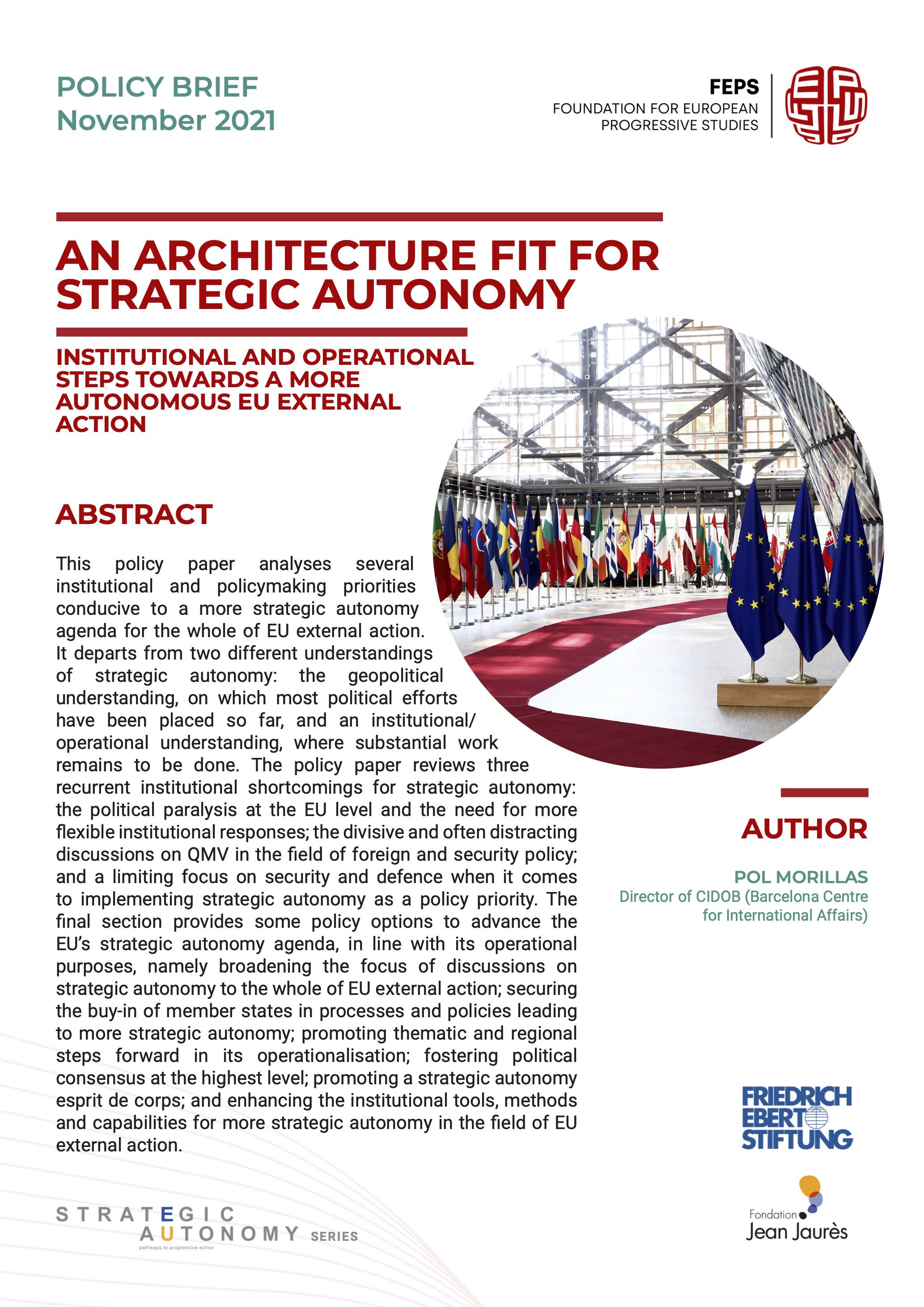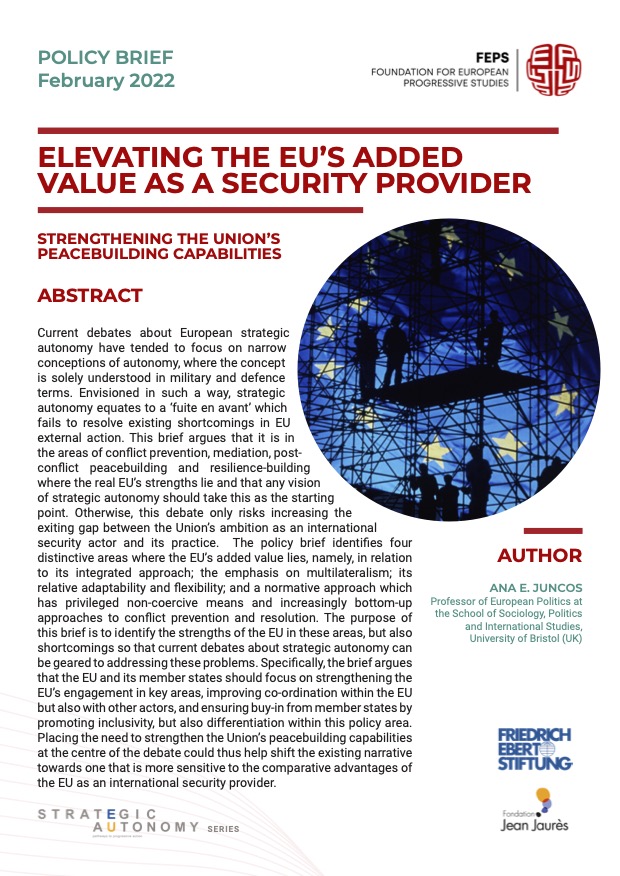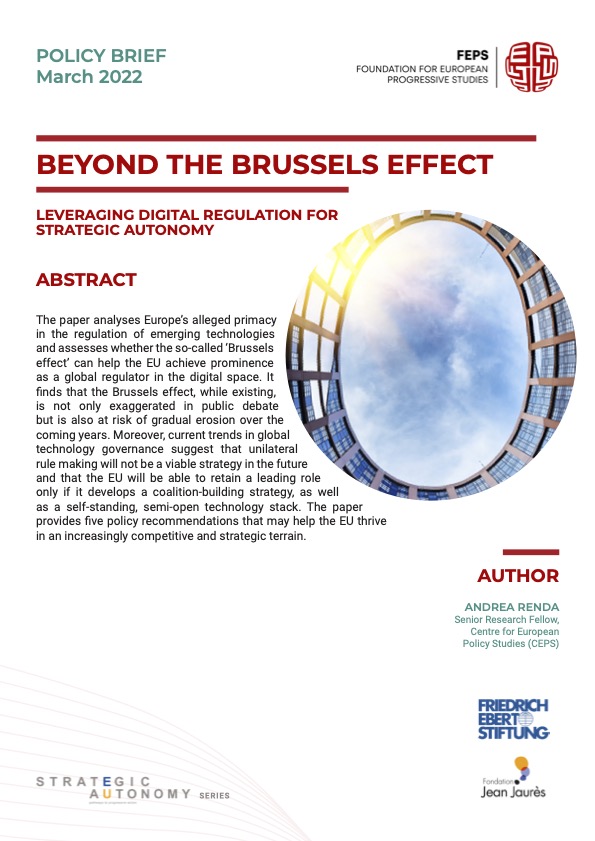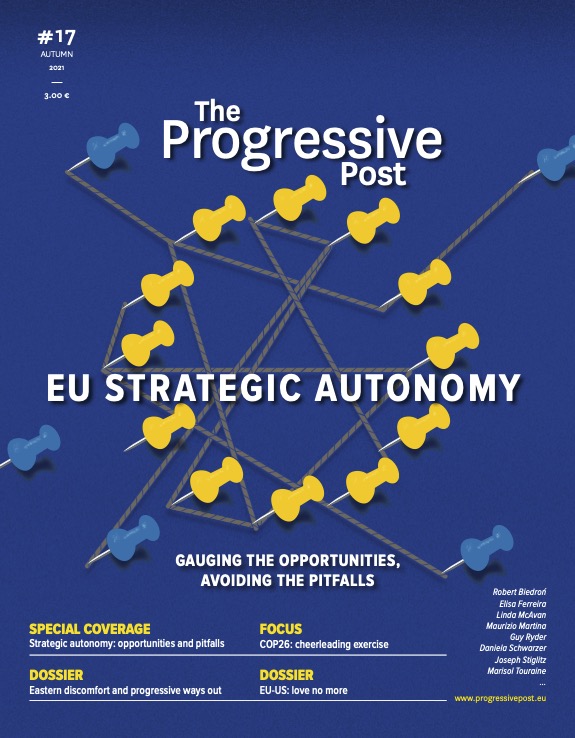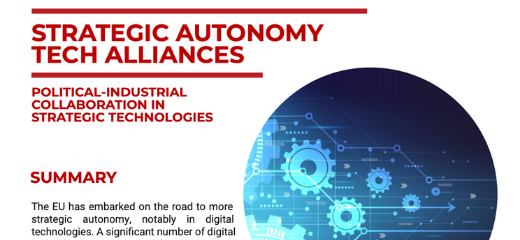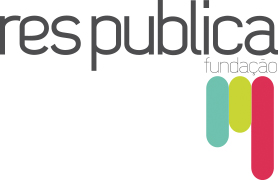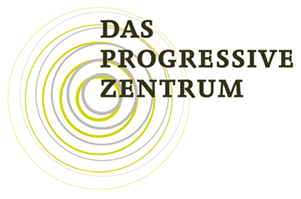Strategic Autonomy
Project
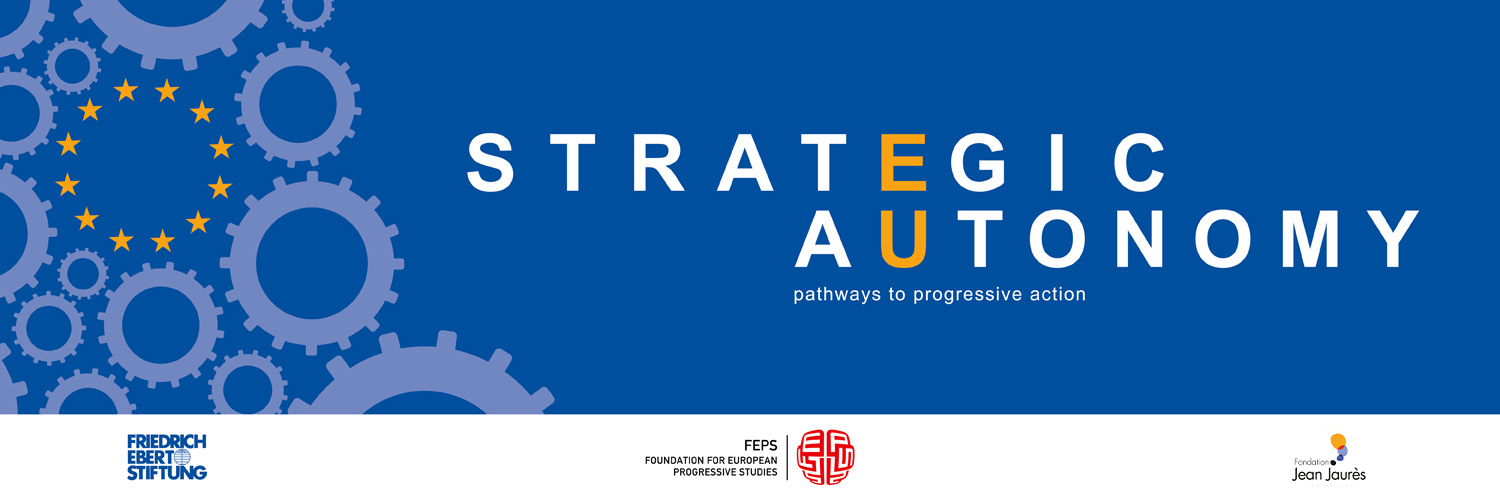
About the Project
Does the EU have the capacity and agency to set priorities and make decisions autonomously in its external action? What are the necessary political, institutional and material steps to get there? How can strategic autonomy help the EU to face the challenges within and beyond European borders?
To answer these questions, the Foundation for European Progressive Studies (FEPS), in cooperation with the Brussels office of the Friedrich-Ebert-Stiftung (FES) and the Fondation-Jean-Jaurès, launches "Strategic Autonomy – pathways to progressive action", a new flagship research project aimed at investigating the concept of 'European strategic autonomy' (ESA).
Despite the concept getting more central in EU affairs circles every day, there is a persistent lack of clarity on what European strategic autonomy actually means. For this reason - and with the debate over ESA's definition, content and implications in full swing - it's time for progressive thinkers to provide an in-depth analysis of the concept and set an agenda on where to direct and how to operationalize the term.
Publications
Security & Defense
An Architecture fit for Strategic Autonomy, by Pol Morillas
This policy paper analyses several institutional and policymaking priorities conducive to a more strategic autonomy agenda for the whole of EU external action. It departs from two different understandings of strategic autonomy: the geopolitical understanding, on which most political efforts have been placed so far, and an institutional/operational understanding, where substantial work remains to be done.
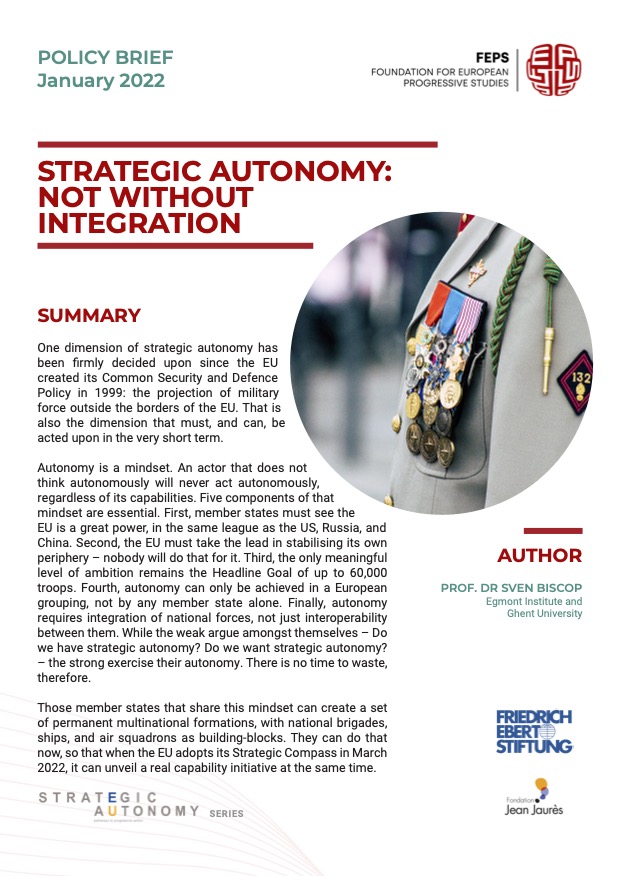 Strategic Autonomy: Not without integration, by Sven Biscop
Strategic Autonomy: Not without integration, by Sven Biscop
One dimension of strategic autonomy has been firmly decided upon since the EU created its Common Security and Defence Policy in 1999: the projection of military force outside the borders of the EU. That is also the dimension that must, and can, be acted upon in the very short term.
Elevating the EU’s added value as a security provider, by Ana E. Juncos
This brief argues that it is in the areas of conflict prevention, mediation, post-conflict peacebuilding and resilience-building where the real EU’s strengths lie and that any vision of strategic autonomy should take this as the starting point. Otherwise, this debate only risks increasing the existing gap between the Union’s ambition as an international security actor and its practice.
Digital & Technology
Leveraging Digital Regulation For Strategic Autonomy, by Andrea Renda
The paper analyses Europe’s alleged primacy in the regulation of emerging technologies and assesses whether the so-called ‘Brussels effect’ can help the EU achieve prominence as a global regulator in the digital space. It finds that the Brussels effect, while existing, is not only exaggerated in public debate but is also at risk of gradual erosion over the coming years.
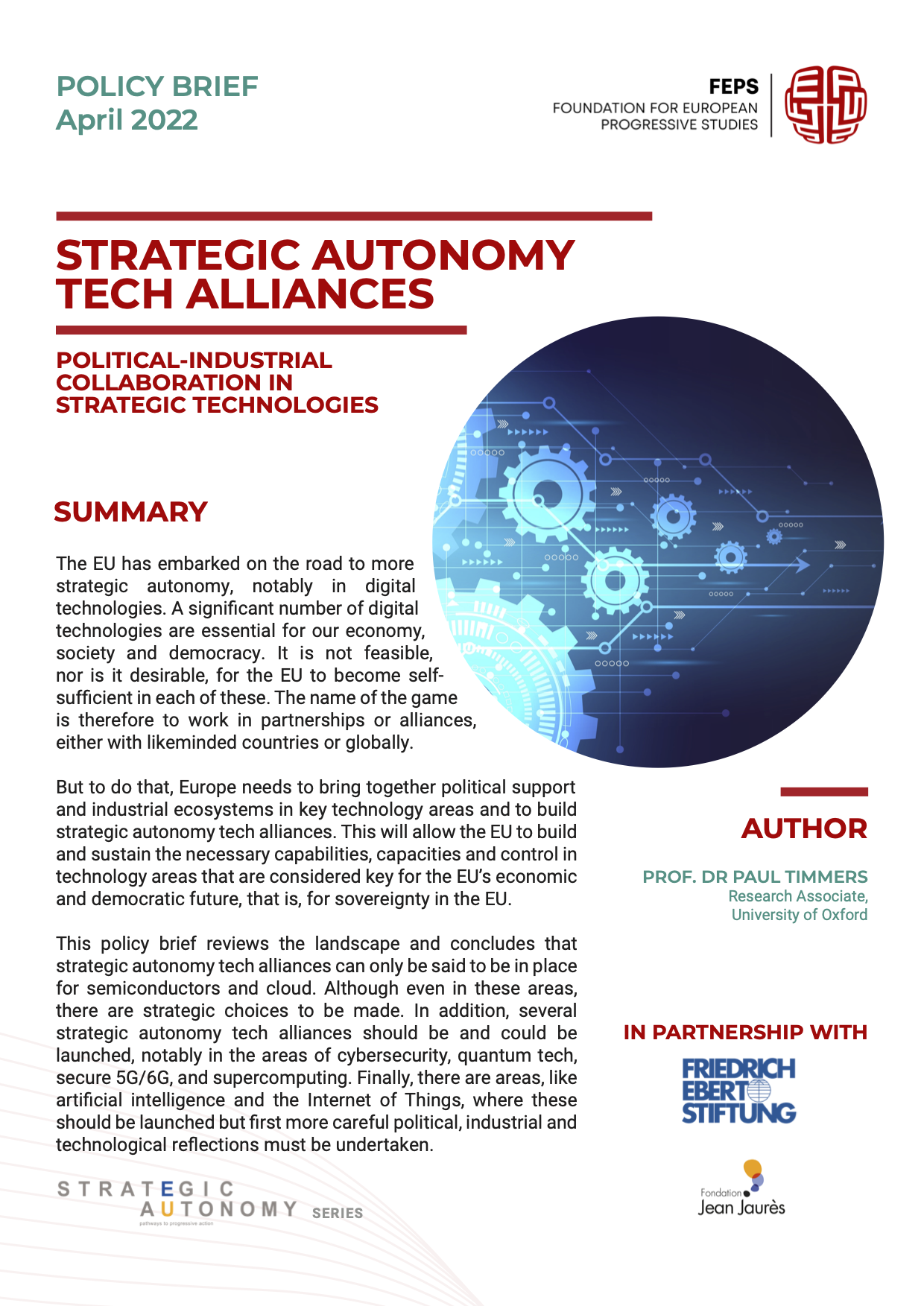 Strategic Autonomy Tech Alliances, by Prof. Dr Paul Timmers
Strategic Autonomy Tech Alliances, by Prof. Dr Paul Timmers
Europe needs to bring together political support and industrial ecosystems in key technology areas and to build strategic autonomy tech alliances. This will allow the EU to build and sustain the necessary capabilities, capacities and control in key technology areas. This policy brief reviews the landscape and concludes that strategic autonomy tech alliances can only be said to be in place for semiconductors and cloud. Although even in these areas, there are strategic choices to be made.
Economy & Trade
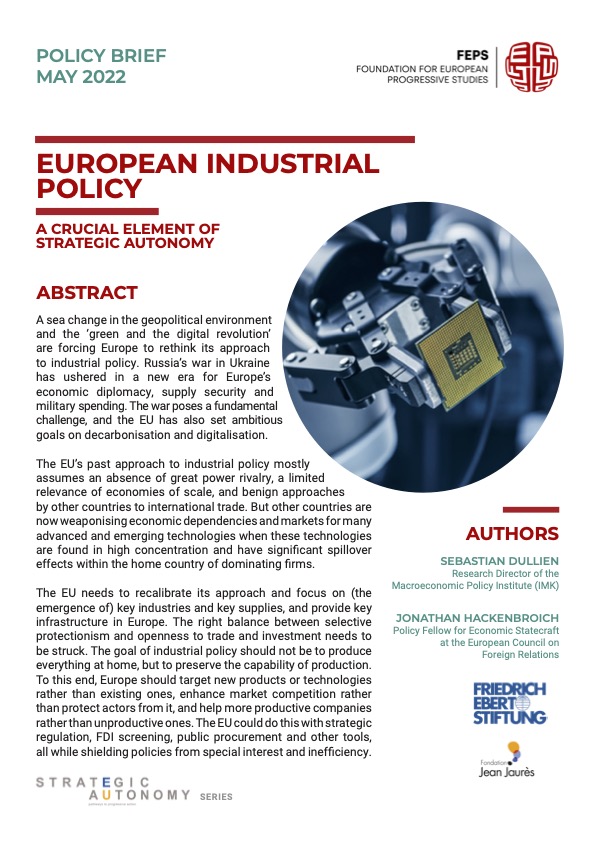
European Industrial Policy: A crucial element of strategic autonomy, by Jonathan Hackenbroich and Sebastian Dullien
This Policy Brief, as part of a more extended reflection of the European Strategic Autonomy, reflects on the relevance of a solid industrial policy and the main lines of action to construct it. Russia’s war in Ukraine has ushered in a new era for Europe’s economic diplomacy, supply security, and military spending. The war poses a fundamental challenge, and the EU has also set ambitious goals for decarbonisation and digitalisation.
Progressive Post Dossier
The EU finds itself increasingly compressed between intensifying global rivalries, while global issues urging collective responses and multilateral solutions continue to unfold. Global topics and the European Union's approach to them are at the core of the latest issue of the Progressive Post, FEPS flagship magazine. Find here the Dossier on European Strategic Autonomy.
- Facing the risks: making strategic autonomy work in practice by Vassilis Ntousas
- The US cannot escape the European strategic autonomy debate by Martin Quencez
- European strategic autonomy and human rights by Daniela Schwarzer
The Working Groups
High-level policy experts and academics will address the topic from three complementary perspectives - namely 1) Security and Defence, 2) Economics and Trade, and 3) Digital and Technology - and will provide analysis and concrete, actionable recommendations for policymakers.
1. Working Group on Security and Defence
Project Lead: Vassilis Ntousas, Senior International Relations Policy Advisor, Foundation for European Progressive Studies (FEPS)
External Advisor: Nicoletta Pirozzi, Head of Programme on European Union and Institutional Relations Manager, IAI (Istituto Affari Internazionali)
Authors:
- Pol Morillas, Director, CIDOB (Barcelona Centre for International Affairs)
- Claudia Major, Head of Research Division, International Security, SWP (German Institute for International and Security Affairs in Berlin)
- Sven Biscop, Director, Europe in the World Programme, Egmont – The Royal Institute for International Relations
- Ana Juncos, Professor European Politics, School of Sociology, Politics and International Studies, University of Bristol
2. Working Group on Digital and technology
Group Leader: Justin Nogarede, Digital Policy Adviser, Foundation for European Progressive Studies (FEPS)
External Advisor: Patryk Pawlak, Brussels Executive Officer, European Union Institute for Security Studies (EUISS)
Authors:
- Andrea Renda, Senior Research Fellow, CEPS (Centre for European Policy Studies)
- Paul Timmers, Research Associate, Oxford University
- Julia Anderson, Economist, European Bank for Reconstruction and Development
- Katja Bego, Principal Researcher and Data Scientist, Technology Futures and Explorations Team, NESTA
3. Working Group on Economics and Trade
Group Leader: David Rinaldi, Director of Studies and Policy, Foundation for European Progressive Studies (FEPS)
External Advisor: Edward Knudsen, Doctoral researcher, University of Oxford and Affiliate Research Fellow, Jacques Delors Centre
Authors:
- Giorgios Papakonstantinou, School of Transnational Governance, EUI and former Minister for the Environment, Energy and Climate Change and Minister of Finance
- Sebastian Dullien, Research Director, Institut für Makroökonomie und Konjunkturforschung (IMK), Macroeconomic Policy Institute, Hans-Böckler Foundation
- Elina Ribakova, Deputy Chief Economist, International Institute of Finance (IIF)
- Elvire Fabry, Senior Research Fellow, Jacques Delors Institute
We are already providing analysis and concrete recommendations for policymakers
FEPS team members @VNtousas, @Rinaldi_David & @JNogarede are presenting the EU #StrategicAutonomy research project to the foreign affairs horizontal working group of @TheProgressives at the 🇪🇺 @Europarl_EN!
— FEPS (@FEPS_Europe) February 8, 2022
ℹ️: https://t.co/zrxNtXCIyA pic.twitter.com/PYtFjhSvSZYou can follow the progress of this research project by following FEPS on Twitter, YouTube, Facebook, Instagram or LinkedIn.


